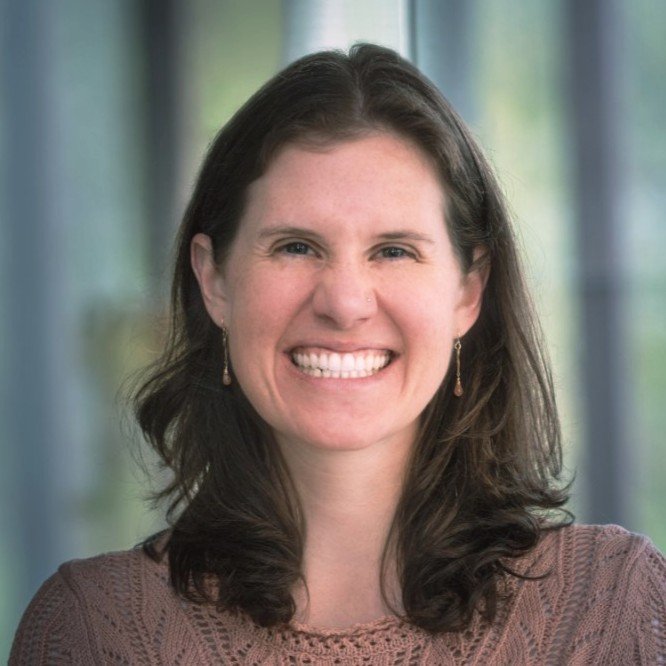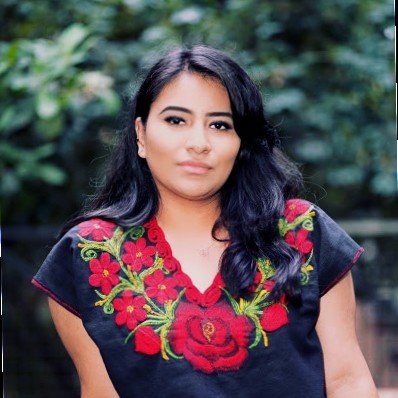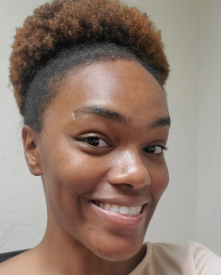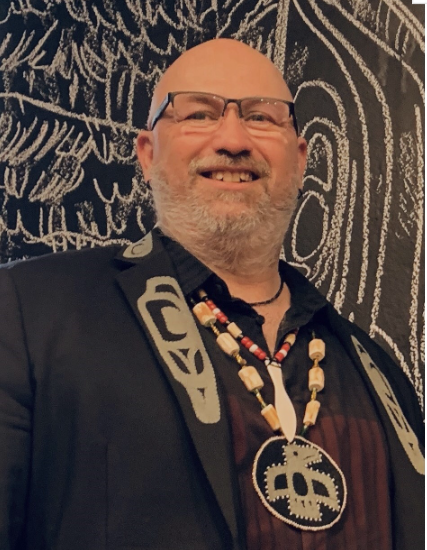Matt Peel
Digital Equity Manager, Evergreen Goodwill of Northwest Washington
Interview by Danyl Stephan Kok & Caleb Brady
November 01, 2022
Matt Peel is the Digital Equity Manager for Evergreen Goodwill, which operates 24 retail stores, 30 donations sites, and five job training centers across five Washington State counties (King, Snohomish, Skagit, Whatcom, and Kitsap). Peel shared with us what digital equity means to him, and how his work at Goodwill is centered around this definition. A highlight for us was learning about several impactful projects Peel has worked on to move Washington closer to digital equity. This interview was edited for clarity and brevity.
Q. What is your definition of Digital Equity?
MP: Digital equity is providing three things to everyone: First, digital devices — computers, tablets, smartphones, and so forth. Second, access to the internet, which is used every day for all kinds of uses by almost everyone. And third, digital skills, which is about making sure that everyone knows how to use their device, knows how to use the internet and how to use it safely — that is, how not to get scammed or get in trouble.
“Just because you give someone a computer and internet access doesn’t mean they know what to do.”
Q: What about it motivates you? What are you passionate about in this space?
MP: It’s really fulfilling to help people improve their lives. I am passionate about the small ways we can help people because they will eventually lead to bigger things in their lives. Seeing someone get those digital skills or that lightbulb turned on — that really helps drive what I am doing.
Q. What values and/or principles are important for everyone in this space to do good work?
MP: The first is recognizing that there is digital inequity, or a digital divide, that creates this huge gap between people who have digital skills and people who don’t. It’s easy to think that everyone has the same level of access to the internet and digital skills. This is why being very open-minded and understanding that some people just don’t have the opportunity to get those things should put you in a mindset where you’re empathetic about where they are and where they’re starting from.
Patience is also an important principle, in some cases, because when you’re teaching people new skills, they can get easily frustrated.
Lastly, it’s important to recognize that there are many programs and services in the community that can be used by people who need to bridge that digital divide. Digital navigators who know where to get free or cheap internet, who know where to possibly get a free device for someone who may qualify, and who know where to point someone to get free or cheap classes to learn digital skills are very important.
Evergreen Goodwill’s Digital Equity Bus is a portable classroom that moves between the five counties they serve. It’s been so successful, the organization is planning to get one for each county.
Q. What have been big wins for you and how did they happen? What sorts of supports were needed for them?
MP: The Evergreen Goodwill Digital Equity Bus. I manage a bus that Evergreen Goodwill purchased and customized to turn into a mobile classroom. The bus resembles a large airport shuttle bus with all the seats taken out, completely gutted, and reconfigured with classroom-style seating instead, along with a huge interactive whiteboard. It’s also got an antenna on it so it can pick up AT&T or T-Mobile signals that then produce a wi-fi network for the internet.
This is one of the innovative ways Evergreen Goodwill has responded to providing classes to people who can’t come to classes at one of our training centers. This was especially important during the pandemic. With this mobile classroom, Evergreen Goodwill can go out to locations in the five counties that would otherwise not be served offering the same kind of classes in the bust that Evergreen Goodwill usually teaches in the classroom: digital skills, English, and computer skills.
It’s been successful enough that we are now in the process of getting a second Digital Equity Bus. Our long-term goal is to have one of these buses in each of the five counties we serve.
The Goodwill Connect Project. Another project that we think is working well is The Goodwill Connect Project, which is funded by the Washington State Department of Commerce. The department allocates money given by the state to different organizations to promote digital equity. For the first time ever, Goodwill franchises across the state joined forces to apply for this funding. Each Goodwill has been independent up to this point, so to have them collaborate for this funding and planning has been significant.
Through the Goodwill Connect Project, Evergreen Goodwill has provided hundreds of laptops with internet access and hotspots to people in need, as well as resources on how to use the donated devices. We also provide information on where to take digital literacy classes and how to get free or cheap internet. Initially, the project was planned for only six months, but the state extended it for another year.
Anyone in Washington can call the Goodwill Connect hotline to check if they qualify for free devices and learn about digital skills training: 844-GWCONNECT OR 844-492-6663.
The Evergreen Goodwill Technology Lending Library. Before the pandemic, Evergreen Goodwill only taught in-person classes. When the pandemic hit, we had to shut down and switch to online classes. Now, Evergreen Goodwill offers hybrid concurrent classes — having in-person students and live remote students at the same time. This brings up the need for getting devices to our students.
To meet that need, we developed a technology lending library, allowing students without a computer or internet access at home to check out a laptop and a hotspot, and join their classes remotely.
We have been steadily increasing the items in this tech library. Currently we have over 1,000 devices, many of which were purchased through grants in collaboration with other organizations.
Q. What is your organization’s goal in moving toward digital equity? What steps are being made by your organization to reach that vision?
MP: The goal of Evergreen Goodwill is to continue to provide three levels of access: digital devices, internet connectivity, and skills.
Providing devices — Technology Lending Library
Evergreen Goodwill is going to continue to try to get grants and add to that library. Currently, we lend to anyone who is taking classes remotely, but the long-term goal is to lend out a device to every single student, including those attending classes in-person.
Providing internet access — continuing to get more hotspots
In November 2022, Evergreen Goodwill received 300 hotspots and got another grant to purchase another 200 hotspots. A total of 500 new hotspots will be enough for every student who needs to borrow one to take our classes. The hotspots will also be useful for people working with Evergreen Goodwill’s job coaches to look for a job, work on interview skills or create a resume.
Providing digital skills — just something we’ve always done
Evergreen Goodwill has been offering basic computer classes for decades, covering in-demand digital products such as Excel, Word, Google Suite operations, as well as skills such as keyboarding and typing. One instructor has been with us for 20-25 years, teaching on big old computers back in the day. So even back then we were teaching computer classes, which Evergreen Goodwill definitely wants to continue.
One thing Evergreen Goodwill is going to do is look at the classes and programs we offer and see if they need to be updated — whether everyone is still using PowerPoint, or if there is something else we should start teaching that would be more helpful for people. In 2023, we’re going to assess everything that we offer and assess what the community needs. What kind of computer or general skills are employers looking for when they hire people we are training, and can we offer classes to help people get those skills so they can get those jobs. We do this through a formal process called a community needs assessment. We survey different organizations, businesses, community colleges, and universities, and do thorough research. From that research, we will determine what the community needs, as far as skills and jobs go. We will look at what we currently offer, if we need to start offering new things, or if we need to stop offering something because it’s not very useful anymore. Evergreen Goodwill has a team that is going to start doing that at the beginning of 2023 so that we can stay current.
Q. What’s an example of some good work so far and who’s been doing it? Who would you like to give a shout out to?
MP: All of the Goodwills in the state are doing good work. Working together with them to provide hundreds of laptops and hotspots is just such a new and amazing project. Twenty five digital navigators have been hired to help create jobs through this project and to hand out these devices to people, helping make an impact on their lives. The Goodwill digital navigators are the ones who run a majority of the operations, taking the calls on the hotline (844-GWCONNECT OR 844-492-6663), giving out devices and showing people how to use them, and providing other resources to address digital inequity.
There are other good organizations out there doing digital equity work. Evergreen Goodwill has been partnering with Comcast, which is interested in helping people bridge the digital divide. It’s important to note the win-win situation where the company can make money as well as help the community. Comcast has done a couple of things for Evergreen Goodwill. Firstly, they have given us a grant to help buy some of those laptops for the Technology Lending Library. Another Comcast grant has allowed us to build high-tech classrooms called Lift Zone Labs. These labs have ceiling-mounted cameras and ceiling-mounted microphones installed so that they can do their online classes using that technology. Lift Zone Lab microphones and cameras are set up in a way that lets them capture everything in the classroom so that teachers wouldn’t have to mess with webcams. Lastly, Comcast was also very kind to install free wi-fi networks at all of Evergreen Goodwill’s learning centers. The win-win situation applies again here, as the company’s involvement can be seen as pat of a marketing strategy, but they’re helping people out anyway.







